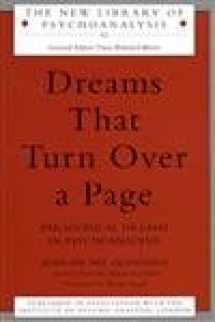
Dreams That Turn Over a Page (The New Library of Psychoanalysis)
ISBN-13:
9781583912652
ISBN-10:
1583912657
Edition:
1
Author:
Jean-Michel Quinodoz
Publication date:
2002
Publisher:
Routledge
Format:
Paperback
120 pages
Category:
Mental Health
,
History
,
Psychology & Counseling
,
Psychoanalysis
,
Reference
,
Psychiatry
,
Psychology
,
History
,
Psychoanalysis
,
Reference
FREE US shipping
Book details
ISBN-13:
9781583912652
ISBN-10:
1583912657
Edition:
1
Author:
Jean-Michel Quinodoz
Publication date:
2002
Publisher:
Routledge
Format:
Paperback
120 pages
Category:
Mental Health
,
History
,
Psychology & Counseling
,
Psychoanalysis
,
Reference
,
Psychiatry
,
Psychology
,
History
,
Psychoanalysis
,
Reference
Summary
Dreams That Turn Over a Page (The New Library of Psychoanalysis) (ISBN-13: 9781583912652 and ISBN-10: 1583912657), written by authors
Jean-Michel Quinodoz, was published by Routledge in 2002.
With an overall rating of 4.0 stars, it's a notable title among other
Mental Health
(History, Psychology & Counseling, Psychoanalysis, Reference, Psychiatry, Psychology, History, Psychoanalysis, Reference) books. You can easily purchase or rent Dreams That Turn Over a Page (The New Library of Psychoanalysis) (Paperback) from BooksRun,
along with many other new and used
Mental Health
books
and textbooks.
And, if you're looking to sell your copy, our current buyback offer is $0.45.
Description
Winner of the 2010 Sigourney Award! In Dreams That Turn Over a Page, the author discusses a particular type of dream that comes after a phase in analysis where integration has taken place. Accompanied by anxiety and fear, which seem surprising as the dream follows a phase of integrative work in the analysis, these dreams are in fact a mark of progression as they indicate a capacity to own anxiety. Quinodoz describes the important technical implications of this understanding, suggesting that it is essential to interpret to the patient that the anxiety indicates not a regression, but a shift in the opposite direction. In addition to the theory and discussion of the literature, he gives many clinical examples of such dreams from patients in psychoanalysis to illustrate the concepts of dreams that turn over a page. As Freud's classical theory of dreams does not by itself suffice to interpret or explain the formation of these particular dreams, Quinodoz invokes contemporary ideas to understand the underlying transformations which bring the 'return' of split-off parts of the self during the phases of integration. The author considers the reasons why dreams that mark this transition have a more powerful impact than others on both patient and analyst, and observes similarities between the clinical impact of such a dream and the aesthetic impact of a work of art.


We would LOVE it if you could help us and other readers by reviewing the book
Book review

Congratulations! We have received your book review.
{user}
{createdAt}
by {truncated_author}


